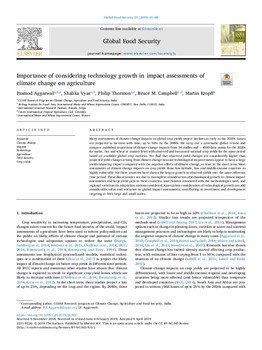Importance of considering technology growth in impact assessments of climate change on agriculture
Many assessments of climate change impacts on global crop yields project declines as early as the 2020s. Losses are projected to increase with time, up to 50% by the 2080s. We carry out a systematic global review and compare published projections of climate change impacts from 34 studies and �?�4500 data points for the 2020s for maize, rice and wheat at country level with observed and forecasted national crop yields for the same period based on available global crop statistics. We find that observed yield changes are considerably higher than projected yield changes arising from climate change because technological improvements appear to have a large yield-enhancing impact compared with the negative effects of climate change, at least in the short term. Most assessments of climate change impacts on crop yields show low-latitude, low and middle-income countries as highly vulnerable but these countries have shown the largest growth in observed yields over the same reference time period. These discrepancies are due to incomplete consideration of technological growth in climate impact assessments and large yield gaps in these countries, uncertainties associated with the methodologies used, and regional variations in adaptation options considered. Appropriate consideration of technological growth can add considerable value and relevance to global impact assessments, contributing to investment and development targeting at both large and small scales

